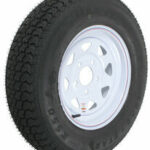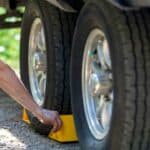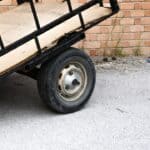Will Trailer Tires Fit on Car Rims? Car rims and trailer tires are not interchangeable. Trailer tires are designed to be mounted on trailer rims, which have a different design than car rims. The main difference between trailer rims and car rims is the width.
Trailer rims are typically wider than car rims, which helps to distribute the weight of the trailer evenly across the tire surface. Car rims are not designed to support the weight of a trailer, so they may bend or break if used in place of trailer rims. In addition, the lug nuts on car rims are not compatible with trailer tires.
Car rims and trailer tires may seem like they would be a perfect fit, but unfortunately they are not. Trailer tires are a different size and require a different type of rim. If you try to put a trailer tire on a car rim, it will not fit properly and could cause problems down the road.
You May Like
Can I Put Trailer Tires on Car Rims?
Yes, you can put trailer tires on car rims. Trailer tires are designed to be used on trailers that are towed behind a vehicle. They are typically wider and have a different tread pattern than regular passenger car tires.
The extra width and different tread pattern help to provide stability and traction when the trailer is being towed.
Are Trailer Rims And Car Rims the Same?
No, trailer rims and car rims are not the same. Trailer rims are typically wider and have a different bolt pattern than car rims. Additionally, trailer rims are designed to support more weight than car rims.
You May Also Like
Do Trailer Rims Have Different Bolt Pattern?
The bolt pattern on a trailer wheel is different from that of a passenger vehicle. The most common trailer wheel bolt patterns are 5 lug and 6 lug, but there are others as well. The bolt pattern is determined by the number of bolts and the distance between them.
What is the Bolt Pattern on Most Trailers?
Trailers come in all shapes and sizes, but most have a standard bolt pattern that makes them compatible with a wide range of vehicles. The bolt pattern on most trailers is typically either 4- or 5-lug, with the latter being more common. This means that there are four or five bolts evenly spaced around the circumference of the trailer’s axle hub.
The bolt pattern can be measured by counting how many lug nuts there are on one side of the axle (excluding the center cap) and then multiplying by two. So, a 4-lug trailer would have eight lug nuts in total, while a 5-lug trailer would have ten.
Most trailers use a standard 4×4.5″ or 4×4.75″ bolt pattern, which is compatible with many popular vehicles such as Ford, Chevy, Jeep, and Toyota trucks and SUVs.
There are also some 6-lug patterns out there, but these are less common and typically only found on larger trailers like RV campers or horse trailers. Whatever your trailer’s bolt pattern may be, make sure to check your vehicle’s owner manual to see what size and type of lug nuts are required for proper installation.
Trailer Rim Vs Car Rim
If you’ve ever had to change a tire, you know that there are different types of rims for different vehicles. Trailer rims and car rims may look similar, but they’re actually quite different. Here’s a closer look at the differences between trailer rims and car rims:
Trailer Rims
Trailer rims are designed to support the weight of a trailer. They’re typically made from steel or aluminum and have a much thicker construction than car rims.
This helps to prevent bending or warping under the heavy load of a trailer. Trailer rims also have a higher load rating than car rims, which means they can safely support more weight.
Car Rims
Car rims are designed to provide stability and handling for your vehicle. They’re usually made from lighter materials like aluminum or magnesium, which helps reduce weight and improve performance. Car rips typically have a lower load rating than trailer rips, so they can’t safely support as much weight.
However, this isn’t an issue unless you’re planning on using your car rim to tow a heavy trailer!
What Wheels Fit My Trailer
If you’re shopping for new wheels for your trailer, it’s important to know what size and type will fit. There are a few things to keep in mind when selecting the right wheels for your trailer.
The first thing to consider is the size of the wheel.
Trailer wheels come in a variety of sizes, from 12 inches all the way up to 22 inches. The size you need will depend on the size and weight of your trailer. If you have a large or heavy trailer, you’ll need larger wheels to support the weight.
Next, you’ll need to decide on the type of wheel. There are two basic types of trailer wheels – steel and aluminum. Steel wheels are stronger and more durable than aluminum, but they’re also heavier.
Aluminum wheels are lighter weight, making them easier to tow, but they’re not as strong as steel.
Radial tires provide better handling and traction, but they can be more expensive than bias ply tires. Bias ply tires are less expensive but don’t handle as well or provide as much traction as radial tires. Now that you know what size and type of wheel will fit your trailer, it’s time to start shopping!
Trailer Wheels on Car
If you’ve ever wondered how those big wheels on trailers work, wonder no more! Here’s a quick guide to understanding how trailer wheels work on cars.
The first thing to know is that there are two types of trailer wheels: tandem and single.
Tandem trailer wheels have two axles side by side, while single trailer wheels have one axle in the middle. Tandem trailer wheels are typically used for larger trailers, while single trailer wheels are better suited for smaller trailers.
No matter what type of wheel you have, they all work the same way: by being connected to the car’s axle via a set of bearings.
The bearings allow the wheel to rotate freely, which is necessary for turning and maneuvering the trailer.
One thing to keep in mind is that because trailer wheels are not part of the car’s suspension system, they don’t benefit from things like shock absorbers. This means that bumps in the road can be felt more acutely through the Trailer Wheels On Car than they would be if you were just driving a car alone.
However, this shouldn’t affect your ability to drive or control the Trailer Wheels On Car; it’s just something to be aware of!
Will Jeep Wheels Fit a Trailer
If you’re wondering if Jeep wheels will fit a trailer, the answer is yes! Jeep wheels are designed to be compatible with a variety of vehicles, including trailers. So if you’re looking to add some extra style to your trailer, consider adding Jeep wheels!
Mustang Wheels on Trailer
A popular question we get here at Mustang360 is whether or not you can tow your Mustang on a trailer with the wheels mounted. The answer is yes, but there are a few things to keep in mind.
First off, be sure that the trailer you’re using has the proper rating for your Mustang.
You don’t want to overload it and risk damaging the trailer or worse, getting into an accident.
Next, when loading up your Mustang onto the trailer, take extra care not to damage the wheels. They’re one of the most expensive parts of your car!
Once they’re on the trailer, secure them so they don’t move around during transport.
Finally, make sure you drive carefully when pulling a trailer – especially if it’s your first time. Take turns slowly and give yourself plenty of space to brake.
It’s better to arrive late than never at all!
Ford Wheels on Trailer
If you’ve ever had a flat tire while driving, you know how frustrating it can be. But what happens when you get a flat tire while hauling a trailer? You can’t just change the tire on the side of the road like you would if you were driving a car.
You have to unhook the trailer and then find somewhere to park it so that you can change the tire. If you’re lucky, you’ll be near a service station or rest stop where you can pull over and take care of the problem. But if you’re not so lucky, you might have to call a tow truck to come and help you out.
Either way, it’s going to be an inconvenience. To avoid this situation altogether, it’s important to make sure that your trailer tires are in good condition before setting out on your trip. Inspect them regularly for any signs of wear and tear, and make sure they’re properly inflated.
If one does happen to go flat while you’re on the road, don’t panic! Just follow these simple steps and you’ll be back on your way in no time:
1. Pull over as soon as possible: If you feel your trailer starting to wobble or veer off course, pull over immediately. It’s better to be safe than sorry!
2. Unhook the trailer: Once you’ve found a safe spot to park, unhook the trailer from your vehicle. If possible, ask someone else to help hold it steady while you disconnect it.
3 . Find level ground: It’s important that your trailer is sitting level when changing the tire so that it doesn’t roll away from under you . Look for a patch of level ground nearby and position your trailer accordingly .
4 Chock the wheels : Once your trailer is level , place chocks (or blocks) behind each wheel To prevent it from moving while you work .
5 Loosen lug nuts : Use a lug wrench (or socket wrench) To loosen The lug nuts on The affected wheel . Don’t remove them completely yet !
6 Raise The Trailer : Now it’s time To raise The Trailer so that You can remove The damaged tire .There are several ways. To do this , but one method is To use A floor jack . Place The jack under One side of The frame and crank It until The wheel is raised off Of The ground .
7 Remove lug nuts & tire : With The wheel still elevated , finish removing All four lug nuts and then carefully take off The damaged tire .
8 Install new tire : Line up The new tire with The empty space left by The old one and carefully lower It into place being careful not To damage It on The way down .
Boat Trailer Tires And Rims
Boat trailer tires and rims are an important part of towing your boat. Here is everything you need to know about choosing the right tires and rims for your boat trailer. Boat trailers are designed to carry boats from one place to another, usually over land but sometimes over water as well.
The three main types of boat trailers are bunk trailers, roll-off trailers, and hydroplane trailers. Bunk trailers support the hull on cradles or bunks that run the length of the trailer’s frame. Roll-off trailers load from a ramp at the front of the trailer and unload by tilting the trailer back so that the boat rolls off onto its keel or cradle.
Hydroplane trailers have large fans that blow air under the hull to lift it out of the water for loading onto the trailer. Most boat trailers have brakes, although some smaller ones do not. Brakes are important because they help control speed when going down hills and make it easier to stop in an emergency situation.
Trailer brakes can be either electric or hydraulic, with electric being more common. If your trailer does not have brakes, you will need to purchase a brake controller for your tow vehicle. The size and type of tire you need will depend on the weight of your boat and trailer combination as well as how you intend to use it.
For example, if you’re going to be doing a lot of long-distance travel with your boat in tow, then you’ll want a tire that has a higher load rating so that it can handle the extra weight without wearing out too quickly.
Likewise, if you’re mostly just using your boat locally around town or on short trips to nearby lakes, then a less expensive tire with a lower load rating may suffice since it won’t be seeing as much wear and tear.
Used Trailer Rims
There are a lot of people out there who have old trailers that they need to get rid of. One option is to sell the trailer and buy a new one, but another option is to simply replace the rims on the trailer. This can be done by buying used trailer rims from a junkyard or online.
The main benefit of replacing the rims on your trailer is that it will save you money. New trailers can be very expensive, so if you can get by with just replacing the rims then it will definitely be worth it. Another benefit is that you won’t have to deal with any of the hassle that comes with selling an old trailer.
If you’re interested in replacing the rims on your trailer, then there are a few things that you need to keep in mind.
First of all, make sure that you measure the width of the rim before you buy anything. You don’t want to end up with rims that are too wide or too narrow for your trailer.
Second, make sure that you choose rims made from sturdy materials such as steel or aluminum. You don’t want them to break easily while you’re driving down the road.
Finally, take some time to compare prices between different sellers before making your purchase.
With a little bit of research, you should be able to find exactly what you’re looking for at a price that’s right for you!
Conclusion
If you’re thinking about outfitting your car with trailer tires, you might be wondering if they’ll fit on your car’s rims. The good news is that, in most cases, trailer tires will indeed fit on car rims. However, there are a few things to keep in mind before making the switch.
First of all, it’s important to know that trailer tires are generally larger and wider than regular passenger car tires. As such, they may not fit perfectly onto your car’s rims. In some cases, you may have to purchase new rims that are specifically designed for use with trailer tires.
Additionally, trailer tires typically have a different load rating than passenger car tires. This means that they can handle more weight and stress. As such, it’s important to make sure that your car can safely handle the added weight of trailer tires before making the switch.
Overall, fitting trailer tires onto your car’s rims is usually possible – but it’s important to do your research beforehand to avoid any potential problems down the road.















